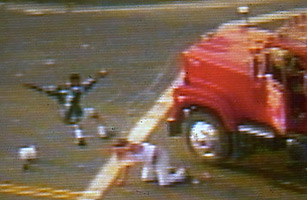
Truck driver Reginald Denny is beaten during rioting after the acquittal of the white policemen who beat black motorist Rodney King.
What did you expect to find when the riot began? Were you taken by surprise?
We expected to find looting and violence. Prior to April 29th, I had done some research and gone to South Central. I talked to gang members, clergy, residents, and I was told if there was a not guilty verdict, then there would be violence and I was told esentially that Asian-owned businesses would be targeted and that non-blacks might find themselves in harm's way.
Everyone knew about the King case, but how much did the Latasha Harlins case figure into it?
The Latasha Harlins case was pretty high profile there. I think it was one more incident that people in South Central considered to be one more example of racism. There was a great deal of anger in South Central, especially in reference to the Harlins case. And given the amount of coverage in the King case, people were very, very angry.
Did you feel that the images you shot would be the defining images of the Los Angeles riot?
Every big news story, every major event seems to have some representative photo. You saw that in Vietnam with Nick Ut photographing the girl running from a napalm attack, the Kennedy assassination. In the L.A. riot, the Reginald Denny attack was the event that captured what the riots were about. Prior to that, the beating of Rodney king was another image that people will not forget. So we had the bookend.
So did you know what you had the moment you shot it?
I immediately knew after seeing what was going on that we had captured a piece of history. Everyone would remember what they were doing at the time of Denny's attack. It symbolized the riot. Now, it was a small part of what happened. But these were the very first attacks and in many ways the catalyst for widespread looting. It either warned you out of harm's way or showed you that police weren't responding.
So journalism aside, how did it affect you personally?
I felt terrible. I couldn't believe what I was watching. It was devastating to see Mr. Denny get attacked and not be able to do anything about it. I'd seen many people shot and covered many stories where people were shot to death, but this was different because of how graphic it was and how long it lasted. But on the other hand, four heroic African Americans wen to save Denny's life at great risk. It showed there were some wonderful people who were there, also.
Your images were broadcast live. Did any one blame you for making the situation worse?
The D.A.'s office said that while we may have spread looting (by broadcasting the first images of mayhem), we spared a lot of lives. Some police blamed us, but I was quick to point out that I showed that the L.A.P.D. deserted the city. If there had been a show of force in the first few minutes, we would not have seen what we saw. I think there would be a different outcome. But the public was extraordinarily positive. Many people thanked us for having saved their lives. Many were en route to go watch the Lakers play at the (Los Angeles) Forum. But they were warned out of harm's way by the broadcast.
Did the broadcast change much for you once it went worldwide?
We were about the same. It didn't change things much for us. We were very good at covering breaking news. It was another example of our aggressive coverage. I know our customers were pleased with what we did. But in the long run the what we shot was looted like the businesses on the ground.
What do you mean?
We took $134,000 in damage to our aircraft covering the riot. We put our lives at risk to get that story. The video was used all around the world without our permission. There was quite a bit of litigation all around the world, but especially in the U.S. on the issue of copyright protection. But there was also a whole slew of copyright law coming from it, too. In the U.S., we are the exclusive owners of the tape. We've won in the millions of dollars in damages, but it cost millions to litigate. It hasn't been a money maker, it's a way of protecting our copyrights. Our backs are against the wall to fight for copyright ownership.
So that brings us to the YouTube case. Where are you on that?
We filed suit against YouTube before the Google purchase. At the time I went after YouTube, I thought it was a small company ripping off our copyrights. When I went to them, they said: 'Why would you sue us, we're just a small company.' So right now, we're still embroiled in it.
So what are you and LANS up to now?
We're doing a show for MSNBC called Why They Run. A lot of times when you see people involved in high speed pursuits, you ask why they run, so we went back and interviewed the people who run. We talk to convicted criminals and police. It should be really interesting.
Looking back, would you go through the riot again? Would you choose to take the same risks?
No. The human cost was awful. I wouldn't have done it again. But really it's a hard thing to answer. Had I not reported, people would have been killed. But the fact that I did report it also spread looting. But as long as I'm wishing, I might as well wish Denny wasn't beaten and Rodney King wasn't beaten.